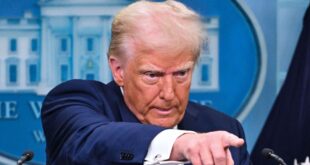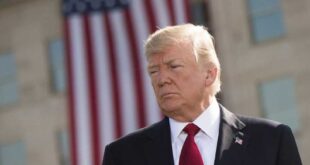In order to make sense of the term “populism” as ordinarily used today, we must first take into account that it has been defined almost exclusively by America’s permanent ruling establishment.
This establishment is sometimes called the “deep state,” but we should resist a narrow political conception of the power structure in question. To convey the nature and reach of it, we need something like the old Aristotelian term “regime,” which refers not merely to government in the modern sense but also to an entire socio-cultural ethos that sets the tone in society and molds the way in which people view the world.
America’s permanent regime consists most importantly of the elites in the media, the universities, Hollywood, Wall Street, Madison Avenue, Silicon Valley, and Washington. This multi-faceted ruling class, linked by similar sensibilities and perspectives on the world, has immense political influence, to be sure, but it has even greater power to shape the country’s moral outlook, its mind, and its imagination, through education, publishing, movies, music, and even advertising. It has the ability to define what is and what is not newsworthy, to lionize or demonize persons and phenomena. What the regime approves of is portrayed as “normal,” “mainstream,” or “moderate”—everything else it can dismiss as extreme, radical, or worse.
A great deal can be learned about this elaborate network of overlapping elites—a small minority of the population that nevertheless wields enormous influence—by examining how it uses the term “populism.” The term is heavy with disapprobation, referring to popular movements that attract support through demagoguery, opportunism, and general irresponsibility. Populism recklessly questions the long-standing practices and assumptions of experienced, enlightened leaders. Populists are rash, unthinking, and vulgar. They make sweeping promises without regard to cost or practicality. They cynically fan and exploit the fears, resentments, bigotry, and hatreds of unsophisticated people. They focus anger on scapegoats. Populists do not much care about constitutional niceties and civil liberties. They are not moderates.
The regime’s disdain for “populism” might seem to imply a principled concern about maintaining high standards of politics and rhetoric. But the increasingly common use of the term follows a revealing pattern. It is only those who challenge the regime who fall in this tainted category; no matter that representatives of the regime have long exhibited the despised traits of “populism” in sometimes egregious ways.
We are told that among the distinctive and disqualifying characteristics of populism are short-sightedness and concealment of the true human and financial costs of policy. With regard to financial, political, and rhetorical matters, what is the standard for irresponsibility? Is it anything like the imprudence and negligence that gave America its staggering national debt—the unfathomable sum of $21 trillion dollars, to which might be added $100 trillion or so in federal, state, and local unfunded liabilities? For decades an allegedly responsible “mainstream” establishment has offered the American people benefits or promises of benefits, fully aware there was no money to pay for them, only more debt. If irresponsibility is the essence of populism, why has this brand of it never been discredited? Kicking the can down the road seems built into the very fabric of the regime. Yet the politicians, technocrats, and pundits creating, condoning, and aggravating this state of affairs are exempted from all charges. They can sit in judgment of others.
This ruling class took the United States to war in a number of distant places, demonizing those being attacked. None of these wars were declared, although the Constitution prohibits war without a congressional declaration. The regime spent enormous amounts of money on these military ventures, greatly adding to the national debt. It created a bloated national security state that undermined traditional American civil liberties, partly through electronic surveillance and the progressive militarization of society. With its Middle East wars, the regime has caused hundreds of thousands of deaths and other suffering and destruction, including rampant religious persecution. It has dislocated millions of people and caused a refugee crisis of monumental proportions that has overwhelmed Europe, which is already under great pressure from a migrant wave. The American power elite has destabilized almost the entire Middle East. You might think of this record as discrediting, but the only ones deemed guilty of recklessness, demagoguery, and shortsightedness are supposed “populists.”
Consider this: for decades, the controlling establishment has tolerated or actively promoted porous or open borders. Permitting millions of undocumented immigrants to enter without a focus on assimilation or impact on American communities has undermined the cohesion of what many consider the American culture, with its classical, British, and Christian traditions and its distinctive Constitution. At a time when the waning of this heritage is already threatening our cohesion—politically, morally, and culturally—the regime has pressed the politically correct position that mass immigration of any sort, legal or illegal, is perfectly compatible with the United States remaining itself, and staying unified and safe. It is “who we are.” But this is a superficial myth and shows either deep ignorance or cynical disregard of history. Culturally disjointed societies are inherently unstable and prone to fragmentation. Contemporary Europeans—though not so much those in the transnational, Europeanist camp—can see even more clearly than Americans the actual effect of migrant waves on their countries. It has brought tension, disorder, and violence. Those who extol the benefits of large-scale immigration show irresponsibility on a grand scale. But who has the reputation for being superficial demagogues?
♦♦♦
We are told that populists employ inflammatory slogans and crude appeals, but how exactly do they violate what has become the new normal within the establishment, whether it be politicians and pundits or the Big Media? Rank partisanship, rabble-rousing, incendiary language, and opportunism—it is all so ubiquitous today that serious, dispassionate public discussion has become virtually impossible. It is increasingly hard to tell so-called “reporting” apart from political activism. The mainstream media, acting like a palace guard for the regime, give favorable attention to regime favorites and ignore or attack people who violate the prescribed orthodoxy. Consider CNN and The Washington Post, which patrol and protect the left flank. As for the Republicrat duopoly, it shows, especially during political campaigns, that it thinks the electorate is made up of illiterates, distinguished only by geography and red or blue state impulses. The regime assumes that the voters are easily moved by appeals to their most primitive instincts and fears.
And so, one asks, what is that makes populism so sinister? The ugliest and most typical feature of populism is, we are told, its paranoid style. It blames what is wrong on scapegoats. Yet we see in the establishment a zeal for blaming society’s ills on dark forces. These include “sexists,” “racists,” “xenophobes,” “homophobes,” and, of course, “deplorables.” After 9/11, the ubiquitous “terrorists” kept the national security state humming and justified interventions abroad. Now there is Russia. Though having a GNP about the same as Italy’s, Russia is in contention for being the greatest threat to America. It even serves as the establishment’s scapegoat for losing the 2016 election. The paranoid style could hardly be more integral to the regime.
It should be evident, then, that the American regime exhibits in abundance the characteristics it attributes to populists. It is financially irresponsible. It makes promises it cannot keep. It spreads deceptive myths. It has a shortsighted and reckless foreign policy agenda. It undermines civil liberties. It employs simplistic demagoguery and cheapens public debate. It plays upon popular fears and anxieties. It singles out groups and individuals for blame.
♦♦♦
At least two conclusions can be drawn. The first is that the use of the term “populism” has nothing to do with principled opposition to the negative traits of so-called populism. The term has but one consistent meaning, more than marginal criticism of the regime that attracts widespread popular support. The purpose of the label is to smear all real opponents of the reigning elites as engaging in irresponsible rabble-rousing.
Secondly, most representatives of the regime seem oblivious of these ironies, which suggests a disturbing lack of self-awareness. They simply assume that they are moderate and enlightened, and that all real criticism of their performance is extreme, dull-witted, and dangerous. They do not realize—or, in a few cases, they recognize but refuse to admit—that they have badly failed their society, and they are determined to hang on to power and privilege.
So what inspires the regime’s charges of populism is a mixture of profound conceit and ruthless, cynical power-seeking.
To point out that these attacks on what the regime calls populism are hypocritical and self-serving is of course not the same as to approve of populism wholesale. Whether putative populists deserve condemnation depends entirely on what ideas, methods, and purposes they espouse. Populism, understood as reckless, unthinking assaults on authority, is, by definition, unacceptable. The ideological populism of Rousseau in France or Jefferson or Paine in America, for example, has been highly pernicious. This much is clear: we cannot turn to representatives of the American regime for standards of responsibility. Indeed, given its egregious mismanagement of American society, a responsible observer may have no choice but to issue his own call to drain the swamp.
First published at the Conservative
Claes G. Ryn is professor of politics and founding director of the new Center for the Study of Statesmanship at The Catholic University of America. He is honorary professor at Beijing Normal University. His many books include America the Virtuous and the novel A Desperate Man.
 Geostrategic Media Political Commentary, Analysis, Security, Defense
Geostrategic Media Political Commentary, Analysis, Security, Defense





